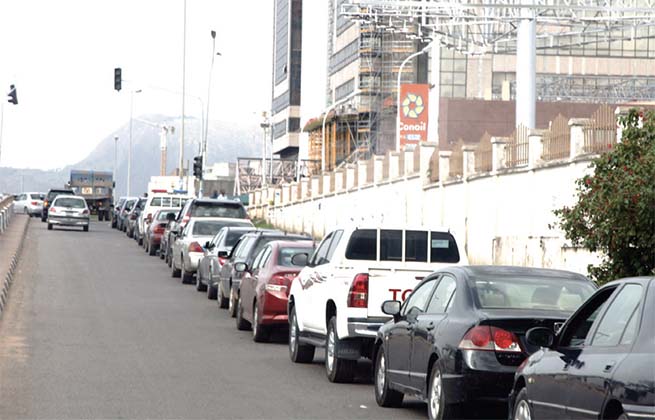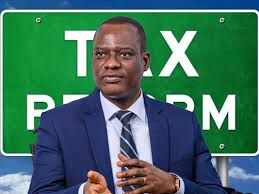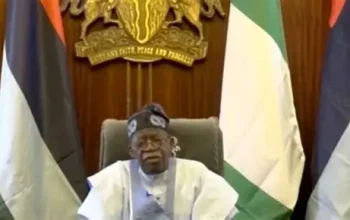The resurgence of fuel queues at filling stations across various Nigerian states has been attributed to a temporary halt in the supply of petroleum products by oil marketers. This decision was taken to protect their assets amidst the ongoing nationwide hunger protests.

In recent weeks, several states, including the Federal Capital Territory, Abuja, experienced fuel shortages. The Nigerian National Petroleum Company Limited initially attributed these queues to disruptions in the discharge operations of several vessels. However, just as the company and stakeholders were addressing the issue, the nationwide hunger and economic hardship protests began on Thursday, August 1, 2024. These protests have once again disrupted the petrol supply, leading to renewed fuel shortages in some states.
Chief Chinedu Ukadike, the National Public Relations Officer of the Independent Petroleum Marketers Association of Nigeria (IPMAN), explained to our correspondent that marketers were advised to close their stations during the protests to avoid the risk of losing their assets.
He noted that many tankers did not load products during the first and second days of the protest, which has caused a disruption in the supply chain, leading to shortages in states that were due to receive these supplies.
“Although the National President of IPMAN, Abubakar Maigandi, encouraged independent marketers to continue their business activities and called on security agencies to protect our facilities, it is important to note that we were instructed by security agencies to suspend selling products during the protests,” Ukadike explained. “This precaution was taken to manage the situation and prevent the vandalism of marketers’ properties. As a result, with trucks not moving, depots not operating, and drivers not driving during the protests, the supply of petroleum products has been significantly disrupted, leading to fuel scarcity at filling stations,” he added.
On Friday, reports emerged that the hunger protests had halted petrol loading at Lagos depots, exacerbating the fuel scarcity. Sources confirmed that depot owners refused to open for business due to fears of potential violence.
An operator, who preferred to remain anonymous, stated that while members of the Nigeria Union of Petroleum and Natural Gas Workers (NUPENG) were prepared to support the depots in loading fuel, the depot owners were unwilling to take the risk.
“There were no activities at the Lagos depots on Thursday and Friday for two main reasons. First, we are still grappling with a shortage of product, and second, there are security concerns on the roads after loading due to the protests,” the operator explained. “NUPENG is ready to assist with loading, but the security situation is a major hindrance. Hopefully, if the situation improves later today, loading may resume tomorrow,” the source stated.
On Sunday, an IPMAN official shared that some trucks had begun skeletal operations and expressed optimism that the fuel supply situation would improve if the protests subsided significantly.
“Now that some trucks have resumed operations and businesses are gradually reopening, independent marketers will also return to business to address the fuel scarcity. However, the scarcity won’t disappear immediately; it will take some time to fully resolve,” Ukadike stated.
He emphasized that the protests, particularly during the initial days, severely disrupted the supply chain, resulting in fuel shortages across many states. “We are currently experiencing the ripple effects of the protests in the form of fuel scarcity, but we hope to resolve the situation soon,” he added.
Ukadike also urged the protesters to halt their actions, stating, “The President has heard your demands and has pleaded with you to give him time to address them. This can only be achieved if the protests come to an end.”
Widespread Scarcity
As of Sunday, several states, including Lagos, Abuja, Katsina, and Delta, reported varying degrees of fuel scarcity. In Warri, Delta State, and surrounding areas, petrol was being sold at filling stations at prices ranging from N850 to N1,000 per litre.
Most dealers attributed the scarcity to the disruption in loading products at depots by members of the Petroleum Tanker Drivers due to the ongoing nationwide #EndBadGovernance protests. However, they expressed hope that the situation would normalize if the protesters ceased their activities and returned to work.
Read also:
- Mixed Reactions as Blord Visits Sabinus at His Lavish Residence
- Timini Egbuson and Bimbo Ademoye Spark Dating Rumors with Romantic Photos
- Bobrisky’s Caution: “Don’t Spray Money or You’ll End Up as a Kirikiri Landlord”
- “I’ll Fly With You Forever” – Singer Portable Honors Girlfriend Queen Dami on Her Birthday
- Tinubu’s Address Fails to Address Protesters’ Demands – Bauchi #EndBadGovernanceInNigeria Leaders Respond
- Throwback: The Moment Erica Was Disqualified from BBNaija
- Herbalists in Benin Join Nationwide Protest Against Government: Video Goes Viral
- EndBadGovernanceInNigeria: PANDEF Urges Protesters to End Demonstrations, Reassures that Their Voices Have Been Heard
- Nigerians Surprised as Lady Buys Full Plate of Rice and Chicken for ₦1k Despite Economic Hardship
- Tonto Dikeh Caught in Controversy: Verydarkman Shares Viral Video of Actress Harassing Car Dealer Over N2 Million Debt
- Nigerian Sprinter Favour Ofili Denied 100m Spot at Paris Olympics
- ‘I Lost Followers for Sharing My Faith Online’ – Singer Qing Madi Opens Up
- FULL LIST: 24 Hours Before Hunger Protest—Steps the FG Has Taken to Prevent the Demonstration
- Actress Wumi Toriola Celebrates Major YouTube Milestone with 100,000 Subscribers



